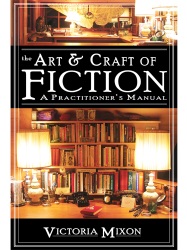Dear Editor, Galley Cat had an interesting twist for your hotel room: “According to the Midnight’s Children author Salman Rushdie will be selecting ten American classics to be featured in the guest rooms at New York City’s Standard Hotel.”
I’m wondering: Which classics would you include for the average hotel guest, which books would you stock in a room for your clients/readers, and which books would you wish for your personal reading pleasure? Rather than ten books each, how about two or three for each, and one in common?—John Elicker
Wow, ten? John, you’re talking to someone with probably 1500 books in her office, not counting the ones I share with my family on the bookshelves all across one end of our living room. When I die, it’s going to be from Book Overdose.
Can I give you a list assuming those hotel guests are all aspiring writers? This is not to say these are the only excellent books I have on writing—they’re just the cream of the crop.
On writing, for writers from beginners to adepts:
1. Bird by Bird, by Anne Lamott
Both funny and kind, Lamott’s book is a classic mainly for its warm, self-deprecating voice. “If I can do it,” Lamott seems to be generously assuring the reader, “you can do it.”
2. Writing Down the Bones, by Natalie Goldberg
A landmark book when it first came out, in it Goldberg has the audacity to suggest writing is about the magical craft rather than the market and then include dozens of wonderful little exercises for sinking ever-deeper into the experience.
3. Screenplay, by Syd Field
If you want to write stories readers want to read, you have to know how to structure them properly. Field’s the king.
4. Self-Editing for Fiction Writers, by Renni Browne & Dave King
When I discovered this book shortly after it came out in 1993, I immediately called my new agent up and interrupted her in a meeting with another author to tell her about it. Indie editors decades before publishing became what it is today, Browne & King are still active in the indie editor community.
5. On Becoming a Novelist, by John Gardner
Who hasn’t read Gardner’s classic work? “It is far more satisfying to write well than simply to write well enough to get published.”
6. Mystery and Manners, by Flannery O’Connor
I refer back to this one more than any other writing book I own. (And I own probably fifty over a hundred.) Charming and profound, O’Connor’s advice on writing just gets wiser and more meaningful the more often you read it.
On being a writer:
7. The Notebooks of Raymond Chandler, edited by Tom Hiney & Frank MacShane
Read it for Chandler’s wonderful spoof on Hemingway, if for nothing else. This is the inside of the mind of a dedicated, brilliant novelist. (Don’t bother with the shallow early draft-ness of the not-really-Gothic Romance he was working on at the end of his life—he’d been wrecked, by that time, by the death of his wife.)
8. Journal of a Novel, by John Steinbeck
Again, the inside of the mind and daily life of a brilliant novelist with such beautiful words on being a writer I posted a whole article once made up entirely of quotes from it. “I don’t care how long it takes. . .You can’t train for something all your life and then have it fall short because you are hurrying to get it finished.”
9. The Writing Life, by Annie Dillard
Lovely, truthful talk about what it means to be a writer, especially the chapter describing the morning her typewriter erupted lava. Over and over, throughout the years, I hear Dillard’s six-year-old neighbor’s words in my head, “Did you really write that story? Or did you type it?”
10. The Notebooks of Henry James
I can’t leave this one out. It will teach you exactly how to think like a great writer.
Of course, John, you’re more than welcome to use my books on writing, The Art & Craft of Fiction: A Practitioner’s Manual and The Art & Craft of Story: 2nd Practitioner’s Manual.
Such an extraordinary craft this is, to which I’ve had the honor of dedicating my life.
“The freshest and
most relevant advice
you’ll find.”
—Helen Gallagher,
Seattle P-I
The Art & Craft of Story


